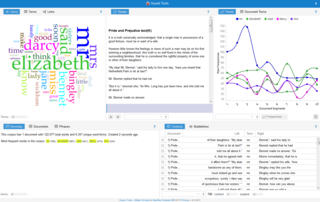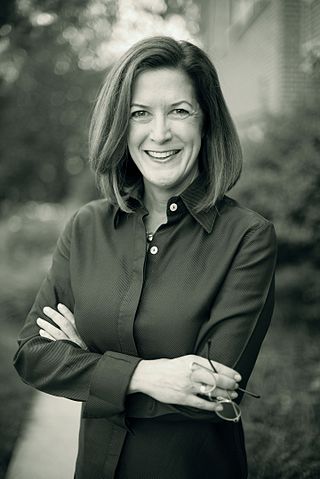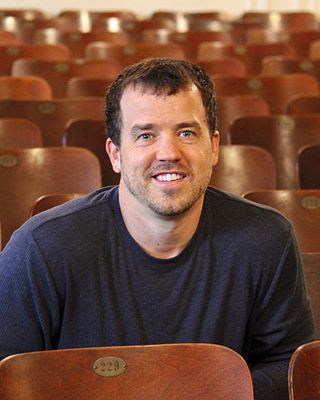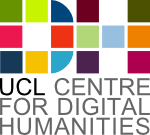In literary criticism, close reading is the careful, sustained interpretation of a brief passage of a text. A close reading emphasizes the single and the particular over the general, effected by close attention to individual words, the syntax, the order in which the sentences unfold ideas, as well as formal structures. A truly attentive close reading means thinking about both what is being said in a passage, and how it is being said and leading it to possibilities for observation and insight.
Biblical studies is the academic application of a set of diverse disciplines to the study of the Bible. For its theory and methods, the field draws on disciplines ranging from ancient history, historical criticism, philology, theology, textual criticism, literary criticism, historical backgrounds, mythology, and comparative religion.

Azar Nafisi is an Iranian-American writer and professor of English literature. Born in Tehran, Iran, she has resided in the United States since 1997 and became a U.S. citizen in 2008.

Digital humanities (DH) is an area of scholarly activity at the intersection of computing or digital technologies and the disciplines of the humanities. It includes the systematic use of digital resources in the humanities, as well as the analysis of their application. DH can be defined as new ways of doing scholarship that involve collaborative, transdisciplinary, and computationally engaged research, teaching, and publishing. It brings digital tools and methods to the study of the humanities with the recognition that the printed word is no longer the main medium for knowledge production and distribution.
Michael Bérubé is Edwin Erle Sparks Professor of Literature at Pennsylvania State University, where he teaches American literature, disability studies, and cultural studies. He is the author of several books on cultural studies, disability rights, liberal and conservative politics, and debates in higher education. From 2010 to 2017, he was the Director of the Institute for the Arts and Humanities at Penn State; from 1997 to 2001 he was the founding director of the Illinois Program for Research in the Humanities. He was the 2012 president of the Modern Language Association, and served as vice president from 2010–2011. He served two terms on the National Council of the American Association of University Professors from 2005 to 2011, and three terms on the AAUP's Committee A on Academic Freedom and Tenure from 2009 to 2018. He was a member of the International Advisory Board of the Consortium of Humanities Centers and Institutes for two terms, 2011-2017. Bérubé was named a University Scholar for research at the University of Illinois in 1995 and was awarded the Faculty Scholar medal for research from Penn State in 2012.
The Association of Literary Scholars, Critics, and Writers (ALSCW) was organized in 1994 as the Association of Literary Scholars and Critics by a group of over 400 scholars troubled by what they saw as an over reliance on post-modern theory in the academy. Among the founding members were Robert Alter, Joseph Brodsky, Denis Donoghue, John Hollander, Alfred Kazin, Mary Lefkowitz, Richard Poirier, Christopher Ricks and Roger Shattuck, "a Who's Who of the American literary establishment." Since 1999, the association has published a review, Literary Imagination.
Franco Moretti is an Italian literary historian and theorist. He graduated in Modern Literatures from the University of Rome in 1972. He has taught at the universities of Salerno (1979–1983) and Verona (1983–1990); in the US, at Columbia (1990–2000) and Stanford (2000–2016), where in 2000 he founded the Center for the Study of the Novel, and in 2010, with Matthew Jockers, the Stanford Literary Lab. Moretti has given the Gauss Seminars at Princeton, the Beckman Lectures at Berkeley, the Carpenter Lectures at the University of Chicago, and has been a lecturer and visiting professor in many countries, including, until the end of 2019, the Digital Humanities Institute at the École Polytechnique Fédérale de Lausanne.
West Virginia University Press is a university press and publisher in the state of West Virginia. A part of West Virginia University, the press publishes books and journals with a particular emphasis on Appalachian studies, history, higher education, the social sciences, and interdisciplinary books about energy, environment, and resources. The press also has a small but highly regarded program in fiction and creative nonfiction, including Deesha Philyaw's The Secret Lives of Church Ladies, winner of the 2021 PEN/Faulkner Award for Fiction, winner of the 2020/21 Story Prize, winner of the Los Angeles Times Art Seidenbaum Award for First Fiction, and a finalist for the National Book Award for Fiction in 2020. John Warner wrote in the Chicago Tribune, "If you are wondering what the odds are of a university press book winning three major awards, being a finalist for a fourth, and going to a series on a premium network, please know that this is the only example." In 2021, another of WVU Press's works of fiction, Jim Lewis's Ghosts of New York, was named a New York Times Notable Book of the Year. WVU Press also collaborates on digital publications, notably West Virginia History: An Open Access Reader.
English studies is an academic discipline taught in primary, secondary, and post-secondary education in English-speaking countries; it is not to be confused with English taught as a foreign language, which is a distinct discipline. An expert on English studies can be called an Anglicist. The discipline involves the study and exploration of texts created in English literature. English studies include: the study of literature, the majority of which comes from Britain, the United States, and Ireland ; English composition, including writing essays, short stories, and poetry; English language arts, including the study of grammar, usage, and style; and English sociolinguistics, including discourse analysis of written and spoken texts in the English language, the history of the English language, English language learning and teaching, and the study of World of English. English linguistics is usually treated as a distinct discipline, taught in a department of linguistics.

Hollis Robbins is an American academic and essayist; Robbins currently serves as dean of humanities at University of Utah. Her scholarship focuses on African-American literature.

Jonathan Gottschall is an American literary scholar specializing in literature and evolution. He holds the title of Distinguished Fellow in the English department of Washington & Jefferson College in Pennsylvania. He is the author or editor of eight books.

Mark Weightman Bauerlein is an English professor emeritus at Emory University and a senior editor of First Things. He also serves as a visitor of Ralston College, a start-up liberal arts college in Savannah.
The Unit for Criticism and Interpretive Theory is an interdisciplinary program developed within the Graduate College and the College of Liberal Arts and Sciences at the University of Illinois at Urbana-Champaign. It works to promote conversations among a range of departments in the humanities, social sciences, and performing arts by organizing lectures, panel discussions, and conferences, as well as a yearly series of lectures on Modern Critical Theory. The unit is one of several dozen centers around the world devoted to critical theory, and was one of the first to be formally established.
Arthur Krystal is an American essayist, editor, and screenwriter living in New York City.
Richard Utz is a German-born medievalist who has spent much of his career in North America. He specializes in medieval studies, and served as president of the International Society for the Study of Medievalism (2009–2020).
In literary criticism and cultural studies, postcritique is the attempt to find new forms of reading and interpretation that go beyond the methods of critique, critical theory, and ideological criticism. Such methods have been characterized as a "hermeneutics of suspicion" by Paul Ricœur and as a "paranoid" or suspicious style of reading by Eve Kosofsky Sedgwick. Proponents of postcritique argue that the interpretive practices associated with these ways of reading are now unlikely to yield useful or even interesting results. As Rita Felski and Elizabeth S. Anker put it in the introduction to Critique and Postcritique, "the intellectual or political payoff of interrogating, demystifying, and defamiliarizing is no longer quite so self-evident." A postcritical reading of a literary text might instead emphasize emotion or affect, or describe various other phenomenological or aesthetic dimensions of the reader's experience. At other times, it might focus on issues of reception, explore philosophical insights gleaned via the process of reading, pose formalist questions of the text, or seek to resolve a "sense of confusion."
Susan Laura Mizruchi is professor of English literature and the William Arrowsmith Professor in the Humanities at Boston University. Her research interests include nineteenth- and twentieth-century American literature, religion and culture, literary and social theory, literary history, history of the social sciences, and American and Global Film and TV. Since 2016, she has served as the director of the Boston University Center for the Humanities.
John David Guillory is an American literary critic best known for his book Cultural Capital (1993). He is the Julius Silver Professor of English at New York University.
Mark Edmundson is an American author and professor at the University of Virginia. He received a B.A from Bennington College in 1974 and a Ph.D from Yale University in 1985. Edmundson specializes in Romanticism, Poetry, and 19th-Century English and American Literature. He is the author of fifteen books, and his essays appear in The Wall Street Journal, The Atlantic, Harper's Magazine, The Chronicle of Higher Education, and The New York Times Magazine. Edmundson was awarded a Guggenheim Fellowship and was a National Endowment for the Humanities/Daniels Family Distinguished Teaching Professor at the University of Virginia.






